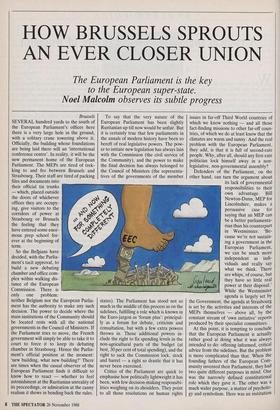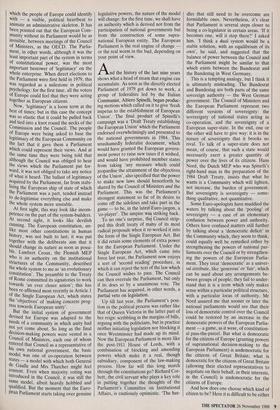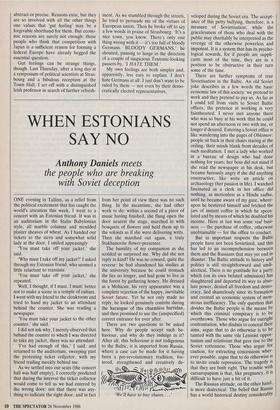HOW BRUSSELS SPROUTS AN EVER CLOSER UNION
The European Parliament is the key to the European super-state.
Noel Malcolm observes its subtle progress Brussels SEVERAL hundred yards to the south of the European Parliament's offices here there is a very large hole in the ground, with a solitary crane towering above it. Officially, the building whose foundations are being laid there will an 'international conference centre'. In reality, it will be the new permanent home of the European Parliament. The MEPs are tired of trek- king to and fro between Brussels and Strasbourg. Their staff are tired of packing files and documents into their official tin trunks — which, placed outside the doors of whichever offices they are occupy- ing, give visitors to the corridors of power at Strasbourg or Brussels the feeling that they have entered some enor- mous prep school for- ever at the beginning of term.
So the Belgians have decided, with the Parlia- ment's tacit approval, to build a new debating chamber and office com- plex within walking dis- tance of the European Commission. There is only one problem: neither Belgium nor the European Parlia- ment has the authority to make any such decision. The power to decide where the main institutions of the Community should be located rests with all the national governments in the Council of Ministers. If the Parliament tries to move, the French government will simply be able to take it to court to force it to keep its debating chamber in Strasbourg. Hence the Parlia- ment's official position at the moment: `new building, what new building?' There are times when the casual observer of the European Parliament finds it difficult to know how to react — whether to feel astonishment at the Ruritanian unreality of its proceedings, or admiration at the canny realism it shows in bending back the rules. To say that the very nature of the European Parliament has been slightly Ruritanian up till now would be unfair. But it is certainly true that few parliaments in the annals of modern history have been so bereft of real legislative powers. The pow- er to initiate new legislation has always lain with the Commission (the civil service of the Community), and the power to make the final decision has always belonged to the Council of Ministers (the representa- tives of the governments of the member states). The Parliament has stood not so much in the middle of this process as on the sidelines, fulfilling a role which is known in the Euro-jargon as 'forum plus': principal- ly as a forum for debate, criticism and consultation, but with a few extra powers thrown in. Those additional powers in- clude the right to fix spending levels in the non-agricultural parts of the budget (at best, 30 per cent of total spending), and the right to sack the Commission lock, stock and barrel — a right so drastic that it has never been exercised.
Critics of the Parliament are quick to emphasise how politically lightweight it has been, with few decision-making responsibi- lities weighing on its shoulders. They point to all those resolutions on human rights issues in far-off Third World countries of which we know nothing — and all those fact-finding missions to other far-off coun- tries, of which we do at least know that the climates are warm and sunny. And the real problem with the European Parliament, they add, is that it is full of second-rate people. Why, after all, should any first-rate politician lock himself aivay in a non- legislative, non-governmental assembly?
Defenders of the Parliament, on the other hand, can turn the argument about its lack of governmental responsibilities to their own advantage. Bill Newton-Dunn, MEP for Lincolnshire, makes a persuasive case for saying that an MEP can be a better parliamenta- rian than his counterpart in Westminster. 'Be- cause we're not sustain- ing a government in the European Parliament, we can be much more independent as indi- viduals and really say what we think. There are whips, of course, but they have so little real power at their disposal.' While the Westminster agenda is largely set by the Government, the agenda at Strasbourg is set by the activities and interests of the MEPs themselves — above all, by the constant stream of 'own initiative' reports produced by their specialist committees.
At this point, it is tempting to conclude that the European Parliament is actually rather good at doing what it was always intended to do: offering informed, critical advice from the sidelines. But the problem is more complicated than that. When the founding fathers of the European Com- munity invented their Parliament, they had two quite different purposes in mind. One was the narrowly defined constitutional role which they gave it. The other was a much wider purpose, a matter of psycholo- gy and symbolism. Here was an institution which the, people of Europe could identify with — a visible, political heartbeat to animate an administrative skeleton. It has been pointed out that the European Com- munity without its Parliament would be as invisible, between meetings of the Council of Ministers, as the OECD. The Parlia- ment, in otker words, although it was the least important part of the system in terms of constitutional rower, was the most important bestower of 'legitimacy' on the whole enterprise. When direct elections to the Parliament were first held in 1979, this was regarded as a milestone in political psychology: for the first time, all the voters of Europe could feel that they were acting together as European citizens.
Now, 'legitimacy' is a loose term at the best of times; but in this case the concept was so elastic that it could be pulled back and tied into a knot round the necks of the Commission and the Council. The people of Europe were being asked to base the legitimacy of the European Community on the fact that it gave them a Parliament which could represent their views. And at the same time they were being told that although the Council was obliged to hear the views which the Parliament put for- ward, it was not obliged to take any notice of what it heard. The ballast of legitimacy acquired by the Parliament, far from stabi- lising the European ship of state of which the Parliament was a part, tended instead to de-legitimise everything else and make the whole system more unstable. At first sight, this may look like incom- petence on the part of the system-builders. At second sight, it looks like devilish cunning. The European constitution, un- like most other constitutions in human history, was not built to last; it was put together with the deliberate aim that it should change its nature as soon as possi- ble. Lambert Croux, the Flemish MEP who is an authority on the institutional structures of the Community, described the whole system to me as 'an evolutionary constitution'. The preamble to the Treaty of Rome committed its signatories to work towards 'an ever closer union'; this has been re-affirmed most recently in Article 1 of the Single European Act, which states the 'objectives' of 'making concrete prog- ress towards European unity'. But the initial system of government devised for Europe was adapted to the needs of a community in which unity had not yet come about. So long as the final decision-making powers were vested in a Council of Ministers, each one Of whom entered that Council as a representative of his own national government, the basic model was one of co-operation between states — a model with which both General de Gaulle and Mrs Thatcher might feel content. Even when majority voting was introduced in the Council, it was still the same model, albeit heavily hobbled and qualified. But the moment that the Euro- pean Parliament starts taking over genuine legislative powers, the nature of the model will change: for the first time, we shall have an authority which is derived not from the participation of national governments but from the construction of some supra- national European entity. The European Parliament is the real engine of change or the real worm in the bud, depending on your point of view.
And the history of the last nine years shows what a head of steam that engine can accumulate. As soon as the directly elected Parliament of 1979 got down to work, a group of federalists led by the Italian Communist, Altiero Spinelli, began produc- ing motions which called on it to give 'fresh impetus to the establishment of European Union'. The final product of Spinelli's campaign was a 'Draft Treaty establishing the European Union' which the Parliament endorsed overwhelmingly and presented to the national governments in 1984. This unashamedly federalist document, which would have granted the European govern- ment power to raise new taxes if it wished, and would have prohibited member states from taking 'any measure which could jeopardise the attainment of the objectives of the Union', also specified that the power to make new laws should henceforth be shared by the Council of Ministers and the Parliament. This was the Parliament's strongest statement so far of its desire to come off the sidelines and take part in the game — to be, in the lateSt\Euro-jargon, a `co-player'. The umpire was, striking back.
To no one's surprise, the{ Council strip- ped this draft treaty of ma by of its most radical proposals when it re-worked it into the form of the Single European Act. But it did retain some elements of extra power for the European Parliament. Under the Single European Act, which came into force last year, the Parliament now enjoys a sort of 'second reading' procedure, in which it can reject the text of the law which the Council wishes to pass. The Council can then overrule the Parliament, but only if its does so by a unanimous vote. The Parliament has acquired, in other words, a partial veto on legislation.
Up till last year, the Parliament's posi- tion in the political process was rather like that of Queen Victoria in the latter part of her reign: scribbling in the margins of bills, arguing with the politicians, but in practice neither initiating legislation nor blocking it once Westminster had made up its mind. Now the European Parliament is more like the post-1911 House of Lords, with a combination of blocking and amending powers which make it a real, though subsidiary, component of the law-making process. How far will this long march through the constitutions go? Richard Cor- bett, the civil servant who plays a key role in putting together the thoughts of the Parliament's Committee on Institutional Affairs, is cautiously optimistic. 'The hur-
dles that still need to be overcome are formidable ones. Nevertheless, it's clear that Parliament is several steps closer to being a co-legislator in certain areas. 'If it becomes one, will it stop there?' I asked him. 'I think a dual system would be a stable solution, with an equilibrium of its own', he said, and suggested that the balance of power between the Council and the Parliament might be similar to that which exists between the Bundesrat and the Bundestag in West Germany.
This is a tempting analogy, but I think it is ultimately misleading. The Bundesrat and Bundestag are both parts of the same sovereign authority — the West German government. The Council of Ministers and the European Parliament represent two different versions of sovereignty: the sovereignty of national states acting in co-operation, and the sovereignty of a European super-state. In the end, one or the other will have to give way: it is in the nature of sovereignty that it brooks no rival. To talk of a super-state does not mean, of course, that such a state would necessarily exert a greater quantity of power over the lives of its citizens. Hans Nord, the Dutch MEP who was Spinelli's right-hand man in the preparation of the 1984 Draft Treaty, insists that what he wants is a Community which will lighten, not increase, the burden of government. But sovereignty is sovereignty — some- thing qualitative, not quantitative.
Some Euro-apologists have muddied the waters by talking about the 'pooling' of sovereignty — a case of an elementary confusion between power and authority. Others have confused matters still further by talking about a 'democratic deficit' in the Community which, they seem to think, could equally well be remedied either by strengthening the powers of national par- liaments over the Council or by strengthen- ing the powers of the European Parlia- ment. They treat 'democratic' as a univer- sal attribute, like 'generous' or 'fair', which can be used about any arrangements be- tween groups of people; they fail to under- stand that it is a term which only makes sense within a particular political structure, with a particular locus of authority. Mr Nord assured me that sooner or later the national parliaments would see that their loss of democratic control over the Council could be restored by an increase in the democratic powers of the European Parlia- ment — a game, as it wen, of constitution- al pass-the-parcel. But what is democratic for the citizens of Europe (granting powers of supranational decision-making to the European Parliament) is undemocratic for the citizens of Great Britain; what is democratic for the citizens of Great Britain (allowing their elected representatives to negotiate on their behalf, in their interests, in the Council) is undemocratic for the citizens of Europe.
And how does one choose which kind of citizen to be? Here it is difficult to be either abstract or precise. Reasons exist, but they are so involved with all the other things one values that 'gut feeling' may be a forgivable shorthand for them. But econo- mic reasons are surely not enough: those people who think that competition with Japan is a sufficient reason for forming a federal Europe have already begged the essential question. Gut feelings can be strange things, though. Last Thursday, after a long day at a symposium of political scientists at Stras- bourg and a bibulous reception at the Town Hall, I set off with a distinguished Irish professor in search of further refresh- ment. As we stumbled through the streets, he tried to persuade me of the virtues of European union. Then he broke off to say a few words in praise of Strasbourg. 'It's a nice town, you know. There's only one thing wrong with it — it's too full of bloody Germans. BLOODY GERMANS,' he shouted, pausing to lunge in the direction of a couple of suspicious Teutonic-looking passers-by, 'I HATE THEM.'
My own feelings are both simpler and, apparently, less easy to explain. I don't hate Germans at all. I just don't want to be ruled by them — not even by their demo- cratically elected representatives.












































































 Previous page
Previous page